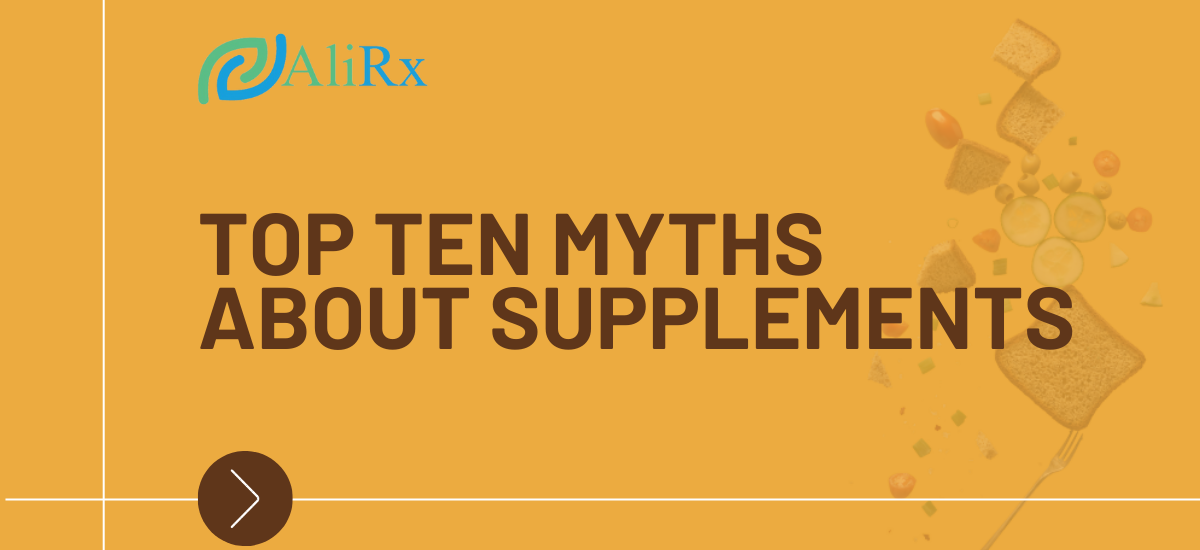Supplements are becoming increasingly popular for people looking to improve their health and well-being, but there is often a lot of misinformation surrounding them.
In this list, we will look at the top ten myths about supplements and debunk them to uncover the truth behind them.
Myth #1 Supplements are always safe and natural.
Not all supplements can be safe and not always natural. It is important to do research on the ingredients, as some supplements may contain dangerous chemicals or additives. That said, what should always happen is to consult with a healthcare professional before taking any supplement.
FACT: Supplements can have side effects and may interact with other medications or medical conditions. Additionally, not all supplements are natural, as some are created synthetically.
Reference: https://ods.od.nih.gov/factsheets/WYNTK-Consumer/
Myth #2: Supplements can replace a healthy diet.
Supplements cannot replace a healthy diet. Eating a balanced diet with plenty of fruits, vegetables, whole grains, and lean proteins is the best way to get the nutrients your body needs. So, even if supplements can be beneficial in certain cases, they should never be used as a replacement for a healthy diet.
FACT: While supplements can be useful in filling nutrient gaps, they cannot replace the benefits of a balanced diet.
Reference: https://www.ncbi.nlm.nih.gov/pmc/articles/PMC4109789/
Myth #3: All supplements are effective.
Just because a supplement is marketed as being beneficial does not mean that it actually is. It is always important to do research and consult with a healthcare provider before taking any supplement, as some supplements may not be effective or may, in fact, be dangerous.
FACT: There is no guarantee that any supplement will work for everyone. Additionally, the effectiveness of supplements may vary depending on individual factors.
Reference: https://ods.od.nih.gov/factsheets/WYNTK-Consumer/
Myth #4: Supplements are regulated by the FDA like drugs.
Dietary supplements are regulated differently than drugs by the U.S. Food and Drug Administration (FDA). While the FDA does review the safety of dietary supplements, they do not have the same level of oversight as drugs.
FACT: Unlike drugs, supplements are not required to undergo pre-market testing for safety and efficacy by the FDA. However, the FDA does regulate supplement labeling and manufacturing practices.
Myth #5: More is always better when it comes to supplements.
Taking too much of certain supplements can be dangerous, so it is important to only take the recommended dose. Additionally, it is important to consult with a healthcare provider before taking any supplement to ensure it is safe and effective for you.
FACT: Taking excessive amounts of supplements can lead to toxicity and adverse health effects. It is important to follow recommended dosages and seek medical advice before taking high doses.
Reference: https://ods.od.nih.gov/factsheets/WYNTK-Consumer/
Myth #6: All supplements are created equal.
Not all supplements are created equal, as some may contain ingredients that have not been adequately tested for safety or may not be as effective as others. It is important to do research and consult with a healthcare provider before taking any supplement to ensure it is safe and effective for you.
FACT: Not all supplements are of the same quality. Some may contain impurities or inaccurate labeling, while others may use higher quality ingredients.
Reference: https://www.nccih.nih.gov/health/using-dietary-supplements-wisely
Myth #7: Supplements can cure diseases.
While some supplements may be beneficial for certain conditions, they should not be used as a substitute for medical treatment. Some supplements may interact with other medications or medical conditions so consult with a healthcare professional first before taking any supplement.
FACT: While some supplements may have health benefits, they cannot cure diseases or replace medical treatment.
Myth #8: All natural supplements are safe.
This is not always true. While some natural supplements may be safe, it is important to do research and, again, consult with a health practitioner before taking any supplement, as some natural supplements may contain dangerous chemicals or additives.
FACT: Natural does not always mean safe. Some natural supplements can have adverse effects, such as interactions with medications or allergic reactions.
Reference: https://www.nccih.nih.gov/health/know-science/natural-doesnt-mean-better
Myth #9: Supplements can help with weight loss.
It is not advisable to believe this because while some supplements may have beneficial effects, they should not be used as a substitute for a healthy diet and regular exercise. Physical activity and a balanced diet are still the most effective ways to lose weight.
FACT: While some supplements may have ingredients that can aid in weight loss, there is no magic pill or supplement that can replace a healthy diet and exercise.
Reference: https://ods.od.nih.gov/factsheets/WeightLoss-HealthProfessional/
Myth #10: Supplements are necessary for optimal health.
Supplements can be beneficial for some individuals in achieving optimal health, but they are not necessary for everyone. Supplements should be used as a complement to a healthy diet, not a replacement for it.
If you have a well-balanced diet that includes a variety of whole foods, you may be getting all the nutrients you need. But, let’s not forget, some people may have dietary restrictions, food allergies, or medical conditions that make it difficult to get all the necessary nutrients from food alone. To that end, supplements can be helpful in filling nutrient gaps.
FACT: While some people may benefit from certain supplements, they are not necessary for overall health and wellbeing. A balanced diet, exercise, and other healthy lifestyle practices are essential for optimal health.
Reference: https://newsinhealth.nih.gov/2013/08/should-you-take-dietary-supplements





